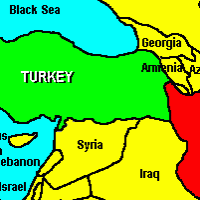![]()
Fri, Jan 6, 2012 | Rubin Reports | By Barry Rubin

U.S. President Barack Obama shakes hands with Turkish Prime Minister Recep Tayyip Erdogan during a meeting in the Oval Office at the White House in Washington on December 7, 2009. (Photo: JEWEL SAMAD/AFP/Getty Images)
Why Is an Anti-American Islamist Obama’s Favorite Middle East Leader?
This article was published in a very different form in the Jerusalem Post.
For the first time in forty years, Israel is not the American president’s favorite Middle Eastern ally. Instead, that role is played by Turkey’s government.
This would not be such a bad thing if we were talking about the “old” Turkey, the secular republic. Unfortunately, President Barack Obama’s favorite advisor among the regional leaders is Turkish Prime Minister Recep Tayyip Erdogan. Pretend all you want but Obama really dislikes — hates? — Israeli Prime Minister Benjamin Netanyahu, and truth be told Netanyahu has done nothing to deserve that treatment.
The fundamental problem with Erdogan is despite being embraced by the United States, he is an enemy of the United States, the West more generally, and Israel. He is on the side of radical, anti-American Islamists who want to wipe Israel off the map. So angry and passionate is Erdogan’s loathing of Israel that the leader of the opposition mockingly but pointedly asked if the prime minister wanted to go to war with the Jewish state.
How obvious should this massive change be? Let me sum it up in one sentence: A few years ago Turkey was an ally of Israel. Now it is an ally of Hamas.
In contrast, the list of Erdogan’s dearest friends includes Hamas, Hizballah, Iran, the repressive Sudanese dictatorship, and Syria (formerly the regime there; now the Islamist portions of the opposition). Erdogan would like to be good buddies with the Muslim Brotherhood forces in Egypt, Libya, and Tunisia, but are suspicious of him, both because he is a Turk and not an Arab; due to memories of Ottoman rule in the past (an empire Erdogan often cites as a role model); and out of sheer competition for power and glory.
Erdogan’s record at home and abroad shows what he and his regime are all about. Indeed, what is truly bizarre about Obama’s judgment is that Erdogan has done little beneficial to the United States and a number of things detrimental to it:
— Iraq war: Whatever you think of the Iraq war, the refusal of the Turkish government to deliver on their promise to let U.S. troops cross into northern Iraq in 2003 was unfriendly and many American officials and members of Congress were outraged at the time.
— Israel policy: Erdogan has gone to an extreme in attacking Israel and sabotaging any possibility of conciliation. His government sponsored the Gaza flotilla knowing that a lot of the Turkish participants were violent Islamists who wanted to stage a confrontation.
— Iran: Erdogan’s regime tried to sabotage sanctions against Iran in 2010. He has repeatedly defended Iran’s President Mahmoud Ahmadinejad and denied that Tehran is seeking nuclear weapons. While there have been some bilateral disagreements — the Turkish decision to allow in NATO installations to watch Iran and backing different sides in Syria, the two countries remain quite close and Erdogan is currently visiting Iran.
— Lebanon and Palestinians: In opposition to U.S. policy, Erdogan backs radical, openly antisemitic Islamist terrorist groups, Hamas and Hizballah. The leader of the Hamas regime in the Gaza Strip has just been received as a hero by Erdogan.
— Syria: While Turkey opposes the continuation of the Asad regime in Syria, this is not out of a love of democracy but rather due to support for a Sunni Islamist takeover there. When Obama gave Erdogan the task of organizing a Syrian opposition leadership, the Turkish regime packed that leadership with Islamists.
— Worldview: Erdogan’s foreign minister wrote a book in Turkish explaining the regime’s strategy of aligning with the Islamic world against the West. This is clearly what Erdogan has been doing. The bonus, however, is that he has been able to pretend otherwise and thus act without any real cost or pressure from the West. On the contrary, he can tell Turkish voters that Obama loves him.
Then there’s Erdogan’s domestic policy which grows worse with each day: increasing repression; massive arrests without trial; trumped-up phony charges of terrorism and treason; intimidation of the media; constitutional changes that give him control over all institutions including the courts. The very real fear and despair within Turkey is generally not reported in the West.
Now the former army chief of staff, retired General Ilker Basbug, has been humiliated and will be put on trial for allegedly trying to overthrow the regime. One thing that’s never explained is that if the hundreds of officers arrested were working to stage a coup how come they never staged even the tiniest deed toward doing so? Meanwhile, journalists are on trial for alleged terrorism and other crimes.
Wait a minute! Maybe that’s what the “Turkish model,” which the Obama Administration wants to spread to the Arabic-speaking world, is: an elected government that makes itself into a dictatorship.
Talk to almost any Turk, at least to those who aren’t regime supporters, and they’ll tell you that the only explanation they can figure out is a conspiracy in which the United States wants an Islamist regime in Turkey to prove its sympathy for Islam and possibly affect such groups elsewhere.
One thing that the regime has done very well — or, at least, benefitted from conditions — is regarding the economy. Despite recent claims that Turkey’s economy is in trouble, the country seems to be flourishing.
Soner Cagaptay, a frequent critic of the regime, describes Turkey as in an unprecedented “sense of global confidence” not seen for centuries; a “Eurasian China;” a country whose economy grew a record 8.2 percent in the third quarter of 2011. Since 2002, he continues the economy has nearly tripled in size. Its trade is shifting from Europe to Islamic countries.
As one journalist put it:
“After suffering through eight coalition governments and four economic crises, the Turkish people have welcomed ten years of a stable…government even if it has meant entrenched single-party rule”.
Cagaptay argues that to continue this economic success the Turkish government must avoid “a belligerent foreign policy.” But that’s a bit misleading. Turkey can have a radical, pro-Islamist foreign policy that is objectively anti-Western at little cost. It just has to avoid getting involved directly in wars, which it can easily do.
Now with the Turkish army broken, Erdogan needs merely complete his control of the courts in order to be able to do whatever he pleases within the country.
And with Obama following Erdogan’s advice and trying to help spread the “Turkish model” — electing radical Islamist regimes that will be repressive at home and backing radicals abroad — things look bright for Erdogan as he steadily consolidates control.
Barry Rubin is director of the Global Research in International Affairs (GLORIA) Center and editor of the Middle East Review of International Affairs (MERIA) Journal. His book, Israel: An Introduction, will be published by Yale University Press in January. Latest books include The Israel-Arab Reader (seventh edition), The Long War for Freedom: The Arab Struggle for Democracy in the Middle East (Wiley), and The Truth About Syria (Palgrave-Macmillan). The website of the GLORIA Center is at http://www.gloria-center.org and of his blog, Rubin Reports, http://www.rubinreports.blogspot.com.



 RSS
RSS










Why Is an Anti-American Islamist Obama’s Favorite Middle East Leader? | Middle East, Israel, Arab Wo http://t.co/zJnNlr57
Why Is an Anti-American Islamist Obama’s Favorite Middle East Leader? | Middle East, Israel, Arab Wo http://t.co/zJnNlr57